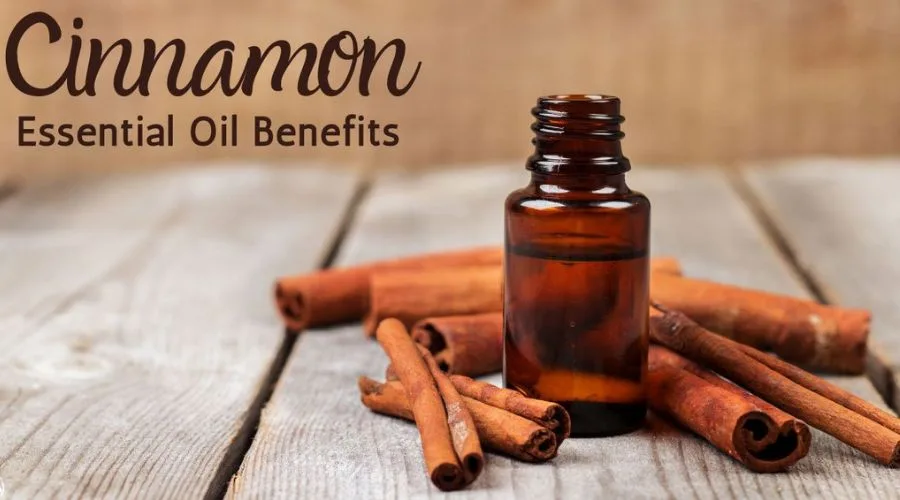The aroma of cinnamon bark essential oil is truly a delight to the olfactory receptors of the brain. That is why these are widely used in aromatherapy, a holistic treatment that uses natural extracts for well-being.
This essential oil, known for its deep, spicy scent, has long held a special place for its therapeutic properties. Aromatherapists have discovered its potent attributes and utilize its comforting and warming aroma to reduce tension and anxiety.
Through its antimicrobial and anti-inflammatory qualities, cinnamon bark essential oil becomes a hidden weapon against infections and muscular soreness. Its aphrodisiac properties also render it a delightful addition to blends for romantic occasions.
This oil proves to be a multifaceted and captivating tool in the field of aromatherapy, one that can be topically applied or diffused to captivate the senses and promote well-being.
Table of Contents
ToggleThe Origins of Cinnamon Bark Essential Oil
The process of crafting exquisite cinnamon bark essential oil commences with the meticulous collection and extraction of the inner bark from cinnamon trees. This ancient technique, cherished for generations, intertwines the history of cinnamon with the realm of aromatherapy.
The aromatic essence of cinnamon has been used in traditional medical practices across numerous countries. Its enduring impact is celebrated for its ability to uplift the spirit, and its historical significance continues to symbolize warmth and vitality.
It continues to exert a significant influence on the domains of scented therapies and natural remedies.
Aroma and Benefits
Cinnamon bark essential oil fills the senses with its distinctive warm and cozy perfume. Besides pleasing the senses, this aromatic elixir offers numerous health benefits.
It stands out as a top choice for relaxation and stress reduction, instilling a sense of calm in the mind. Cinnamon’s invigorating properties contribute to enhanced well-being and mental clarity.
On a physical level, the oil’s warming embrace alleviates tense and uncomfortable muscles. Whether applied topically or inhaled, this oil delivers a holistic experience, harmonizing the mind and body with its soothing fragrance and multiple therapeutic advantages.

Aromatherapy Applications
Within the realm of aromatherapy, practitioners utilize cinnamon bark essential oil in a variety of ways to enhance overall well-being. One prevalent technique includes employing diffusers to disperse and inhale the oil.
A mere few drops of this oil generate a warm and inviting ambience that fosters feelings of comfort and relaxation. It seamlessly combines with other essential oils, enabling the creation of unique and harmonious fragrance blends.
Due to its potency and the potential for skin irritation when undiluted, it is imperative to dilute cinnamon bark oil with carrier oil before applying it topically, ensuring safety and effectiveness in use.
Nonetheless, you can utilize it effectively in dilution to alleviate muscle soreness or stress. Incorporating this oil into massages proves to be an excellent means of elevating holistic health practices since it not only soothes the mind but also relaxes the body.
People seeking to experience the fragrant and revitalizing attributes of the essential oil adore its adaptability in aromatherapy, utilizing it in various applications, from massages to diffusers.
Cautions and Considerations
Exercise caution and be mindful of potential skin reactions when using cinnamon bark essential oil. Consider the precaution of patch testing as this essential oil is potent.
It involves applying a diluted solution of the oil to a small area of skin to check for any adverse reactions, ensuring a safe and enjoyable experience with this potent essential oil.
Let’s see some do’s and don’ts of using cinnamon bark essential oil.
- To prevent skin irritation, dilute cinnamon bark oil with an appropriate carrier oil before using it topically.
- Do think about doing a patch test, which involves dabbing a tiny area of skin with diluted oil to see if there are any negative effects.
- Avoid consuming concentrated forms of cinnamon bark essential oil as they might be toxic.
- Applying undiluted cinnamon bark oil directly to the skin could result in allergic responses or skin irritation.
- Do follow the suggested dosage guidelines and get medical advice before using cinnamon bark oil in your wellness regimen, particularly if you have underlying medical concerns.
Seeking guidance from a specialist is crucial when utilizing cinnamon oil. It ensures the appropriate and safe use of this potent essential oil in various applications.
Beyond Aromatherapy: Additional Uses
Cinnamon essential oil extends its utility beyond aromatherapy, making it a versatile addition to various daily activities. In the realm of cooking, it offers a delectable touch, infusing the kitchen with warmth and spice and elevating the flavors of a wide range of foods and beverages.
Additionally, it serves a purpose in cleaning and home maintenance by acting as a natural fragrance enhancer and fostering a cozy and tranquil ambience.
Also, it is used for personal care as a valuable ingredient in DIY beauty recipes, enhancing products like hair treatments, bath salts, and perfumes, adding a touch of luxury, and encouraging indulgence and overall well-being.
Conclusion
Cinnamon bark essential oil proves to be a versatile gem, extending its applications far beyond aromatherapy.
Its captivating fragrance adds a touch of warmth and spice to culinary creations, enhances home environments by naturally elevating scents, and elevates beauty routines through DIY recipes.
Its alluring scent and adaptability render it a valuable companion in our daily lives, delivering both pleasure and well-being in equal measure.
FAQ's
When choosing a cinnamon bark essential oil, ensure it undergoes steam distillation, comes exclusively from Cinnamomum verum (true cinnamon), and maintains 100% purity. Seek out a product with a strong, sweet, and spicy aroma, a deep golden hue, and a slightly thick consistency. It is vital to purchase from trustworthy suppliers or brands to consistently receive a high-quality product.
Using cinnamon bark oil in aromatherapy on youngsters or pets is generally not advisable. It can prove too potent and may lead to skin irritation or other adverse reactions in sensitive individuals. Prioritizing their safety, it’s essential to select milder essential oils specifically formulated for children and pets, while also following expert guidance and adhering to recommended dilution ratios when employing aromatherapy with them.
Due to its potency, it’s essential to use cinnamon bark oil sparingly in relaxation blends. Commonly, relaxation blends include lavender, sweet orange, and cinnamon bark oil, combining citrus and spice notes to create a comforting, cozy scent. However, using cinnamon bark oil excessively can lead to an overwhelming aroma, so it’s crucial to dilute it properly and consider individual sensitivities.
Using cinnamon bark oil can lead to specific adverse effects, and caution is necessary. When applying this potent oil topically, it should be significantly diluted to prevent skin irritation. It has the potential to induce allergic reactions or irritate mucous membranes, so it’s essential to take necessary care. Also, it’s not recommended for pregnant individuals or those with certain medical conditions, making it advisable to consult a healthcare provider before using it.
You can find authentic and pure cinnamon bark essential oil at reputable businesses that specialize in essential oils, licensed aromatherapists, and well-established health food stores. To confirm authenticity, look for products with clear labeling that includes the oil’s botanical name, Cinnamomum verum. If you seek trustworthy sources, consider reading customer reviews and seeking recommendations from aromatherapy enthusiasts.


